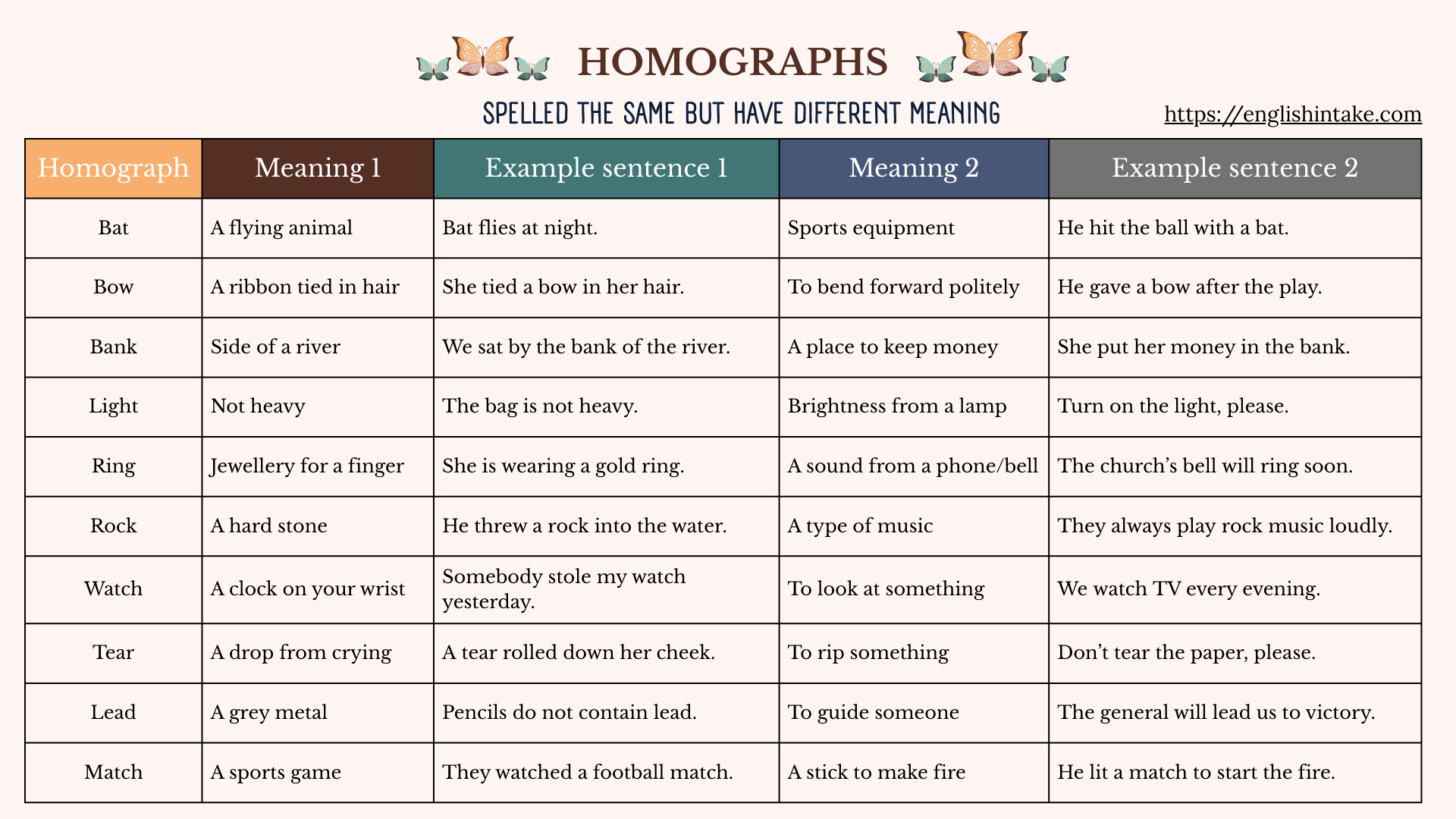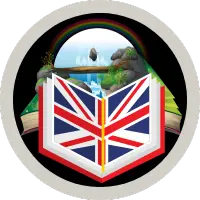1. What are homographs?
The word homograph comes from the Greek words homo (same) and graph (writing). So, homographs are words that are written the same but may have different meanings or pronunciations. They can be confusing, but they are also fun to learn!
2. Homographs matching game
Match each homograph to the correct definition. Each set has 10 questions, and you’ll play up to 5 sets (50 questions). Good luck!
3. Homographs Quiz
How much do you know about homographs?
Quick overview of the quiz!
- There are 48 questions
- You can track your time as you progress
- You get instant feedback on your answers
- You can check your results and review your answers at the end
Time: 00:00
She caught a large bass while fishing in the lake.
The bass in this song is so deep and powerful.
He gave a deep bow to the audience after his performance.
The bow of the ship cut through the waves gracefully.
The wind howled through the trees during the storm.
She had to wind the clock every day to keep it working.
He tried not to tear the paper while unwrapping the gift.
A tear rolled down her cheek as she listened to the sad story.
The dove flew gracefully across the sky.
He dove into the pool to retrieve the lost ring.
We watched the live broadcast of the concert.
The band will live stream their performance tonight.
Please close the door behind you.
The store is close to my house.
The pencil is made of lead.
She will lead the team to victory.
The object on the table is a vase.
I object to this unfair treatment.
He gave her a present for her birthday.
The CEO will present the new strategy at the meeting.
The minute details of the painting were breathtaking.
Wait a minute, I need to grab my coat.
She used polish to make her shoes shine.
He is a Polish immigrant living in the United States.
The children sat in a row during the assembly.
They had to row the boat to the other side of the lake.
Be careful not to tear the paper while opening the package.
A tear fell from her eye as she said goodbye.
The subject of the lecture was fascinating.
The king could subject his people to harsh laws.
The contest winner received a trophy.
He decided to contest the election results.
The entrance to the building was grand and impressive.
The magician's performance will entrance the audience.
The invalid ticket was rejected at the gate.
The hospital provides care for the invalid.
The farmer brought fresh produce to the market.
The factory will produce 1,000 units this month.
The new project will start next week.
The movie projector will project the film onto the screen.
He decided to refuse the offer.
The refuse was collected by the sanitation workers.
Wait a second, I need to tie my shoe.
I second the motion to adjourn the meeting.
The does grazed peacefully in the meadow.
She does her homework every evening.
The desert is a harsh and unforgiving environment.
He decided to desert his post during the war.
4. Examples of homographs
Below is a table of 50 common homographs in English with example sentences and definitions. Each word has different meanings, and sometimes different pronunciations.
1. A flying mammal
1. The bat flew out of the cave at night.
2. A piece of sports equipment used in cricket or baseball
2. He hit the ball with his cricket bat.
1. To bend forward at the waist as a sign of respect
1. The actor took a bow after the performance.
2. The front part of a ship
2. The waves crashed against the bow of the ship.
1. To guide or direct
1. She will lead the team to victory.
2. A heavy metal (chemical symbol: Pb)
2. The pipes were made of lead.
1. To rip something apart
1. Be careful not to tear the paper.
2. A drop of water from the eye
2. She wiped a tear from her cheek.
1. Moving air
1. The wind blew the leaves off the trees.
2. To twist or turn something
2. You need to wind the clock to make it work.
1. A line of things or people
1. The children sat in a straight row.
2. To move a boat using oars
2. They decided to row the boat across the lake.
1. To shut something
1. Please close the door behind you.
2. Nearby or not far away
2. The shop is close to my house.
1. A type of fish
1. He caught a large bass while fishing.
2. A low-pitched sound or voice
2. The singer has a deep bass voice.
1. A dry, sandy area with little rainfall
1. The Sahara is the largest hot desert in the world.
2. To abandon or leave someone
2. He decided to desert his post and run away.
1. A unit of time (60 seconds)
1. Wait a minute, I’ll be right back.
2. Very small or tiny
2. The insect was so minute that it was hard to see.
1. A large mammal
1. The bear roamed the forest.
2. To tolerate or carry a burden
2. She couldn’t bear the pain any longer.
1. A financial institution
1. She deposited money at the bank.
2. The side of a river
2. We sat on the bank of the river.
1. A stick used to light a fire
1. He struck the match to light the candle.
2. A competition or game
2. The football match ended in a draw.
1. A piece of jewellery worn on the finger
1. She wore a gold ring on her finger.
2. The sound a bell makes
2. The church bells began to ring.
1. Brightness or illumination
1. The light from the sun was blinding.
2. Not heavy
2. The suitcase was very light.
1. Correct or morally good
1. You are right about the answer.
2. The opposite of left
2. Turn right at the next corner.
1. A season of the year
1. Flowers bloom in spring.
2. A coiled metal device
2. The spring in the mattress was broken.
1. A movement of water in the sea
1. The wave crashed onto the shore.
2. To move your hand in greeting
2. She gave a friendly wave.
1. A solid mineral material
1. The child picked up a rock.
2. To move gently back and forth
2. She likes to rock the baby to sleep.
1. To move through the air
1. Birds fly in the sky.
2. An insect
2. A fly landed on the food.
1. A written message
1. She wrote a letter to her friend.
2. A character in the alphabet
2. The word "cat" has three letters.
1. A public green space
1. We went for a walk in the park.
2. To leave a vehicle in a place
2. He decided to park the car.
1. A timepiece worn on the wrist
1. She checked her watch for the time.
2. To look at something carefully
2. He likes to watch movies.
1. Just or reasonable
1. The teacher gave a fair grade.
2. A fun event with rides and games
2. We went to the county fair.
1. The sharp end of something
1. The pencil has a sharp point.
2. To direct attention to something
2. He used a stick to point at the map.
1. Friendly or generous
1. She is a very kind person.
2. A type or category
2. What kind of music do you like?
1. To recline or rest
1. He decided to lie down for a nap.
2. To say something untrue
2. She told a lie to avoid trouble.
1. A unit of weight
1. The bag of sugar weighs one pound.
2. The currency of the UK
2. He exchanged dollars for pounds.
1. Happening now
1. The current situation is improving.
2. The flow of water or electricity
2. The river’s current was strong.
1. A specific day on the calendar
1. What is today’s date?
2. A sweet fruit
2. She ate a date for a snack.
1. To drop down
1. Be careful not to fall.
2. The season after summer
2. The leaves change colour in fall.
1. Of high quality
1. She wore a fine silk dress.
2. A penalty payment
2. He had to pay a fine for speeding.
1. The opposite of right
1. Turn left at the traffic light.
2. Past tense of "leave"
2. She left the house early.
1. Unkind or cruel
1. The bully was very mean.
2. To signify or represent
2. What does this word mean?
1. A long written story
1. She is reading a novel by Jane Austen.
2. New or unusual
2. He came up with a novel idea.
1. A thing
1. The object on the table was a vase.
2. To express disapproval
2. She decided to object to the proposal.
1. A person receiving medical care
1. The doctor treated the patient.
2. Willing to wait without complaining
2. She was very patient with the children.
1. A gift
1. He gave her a birthday present.
2. Existing or happening now
2. The present situation is uncertain.
1. To decline or reject
1. She decided to refuse the offer.
2. Waste material
2. The refuse was collected by the truck.
1. A unit of time
1. Wait a second, please.
2. Coming after the first
2. She finished in second place.
1. A basin for washing
1. She washed her hands in the sink.
2. To go down below the surface
2. The boat began to sink.
1. A condition or situation
1. The house was in a messy state.
2. A region of a country
2. California is a state in the USA.
1. A journey
1. They went on a trip to the mountains.
2. To stumble or fall
2. Be careful not to trip on the stairs.
1. In good health
1. She feels well today.
2. A deep hole for water
2. They drew water from the well.
5. How to use homographs correctly
Homographs can be tricky because they look the same but mean different things. Here are some tips to use them correctly:
- Pay attention to the context: the meaning of a homograph is usually clear from the sentence it is in.
- Listen to the pronunciation: some homographs are pronounced differently, which can help you understand their meaning.
- Practice with examples: the more you see homographs in sentences, the easier it will be to understand them.

